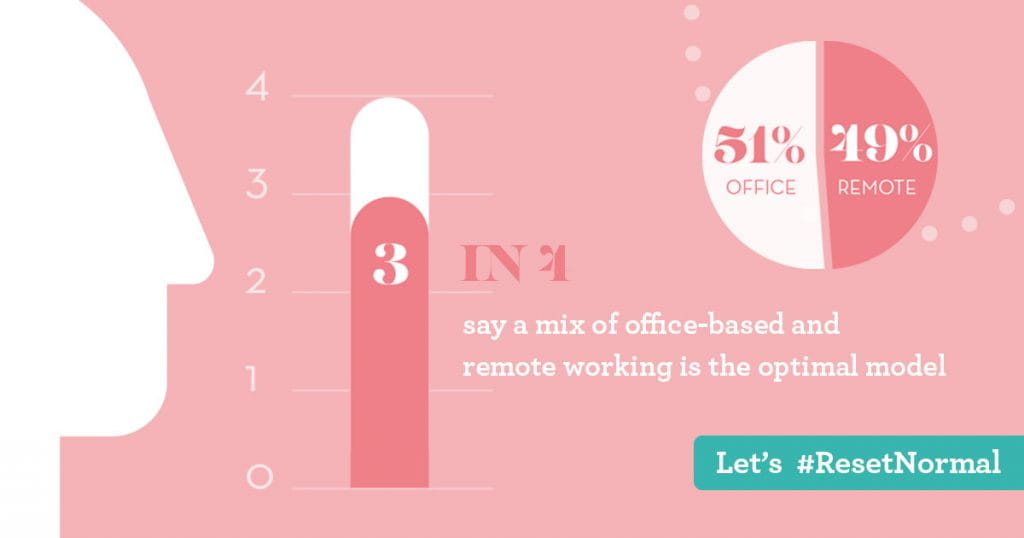This article was originally authored by Alain Dehaze, CEO of The Adecco Group. For me, it is clear that the world of work will never return to the “normal” we knew before the pandemic struck. The opportunity we now have to “reset normal” is one which we shouldn’t squander. To support organisations to better understand the changing workforce landscape, and more specifically – the shifting attitudes and expectations of workers – today the Adecco Group is releasing the results of its latest study, “Resetting Normal: Defining the New Era of Work.”
The report, reflecting the views of 8,000 office-based workers across 8 countries, highlights that flexibility in how and where we work, an evolution in how we lead or are led, and the investments we make in re-skilling and up-skilling will be some of the most critical elements for employers to address in forging their own “better normal”.
COVID-19 has so far tested companies’ agility, flexibility and emergency response on a day-to-day, tactical basis. As we start to emerge from lockdown restrictions, a successful “restart” requires more than the requisite health and safety protocols; it requires renewed trust and collaboration between companies and employees. Employers have an opportunity to “hit reset” on traditional workplace practices – many of which have remained largely unchanged since the industrial revolution.
“Employers have an opportunity to “hit reset” on traditional workplace practices – many of which have remained largely unchanged since the industrial revolution.”
Our study highlights several important topics for employers to translate into action. I’d like to share some thoughts on three particular areas highlighted in the study: how and where we work; the new demands on leadership, and lifelong learning. If companies succeed in addressing these aspects of their business in the post-COVID-19 world, they will take a big stride towards capitalising on the key lessons learned during the pandemic.
Looking first at where we work. In the past, the commitment of office workers has often been judged by their visible presence in the office. Pre-pandemic, office-based employees were generally given occasional permission to work from home, if their manager trusted them.
During lockdown, workers were forced to work remotely, creating what has been dubbed, “the world’s biggest WFH experiment”. Our study shows there are clear benefits – employees favor its flexibility and improved work-life balance, while the vast majority of senior leaders believe that both the company and employees will gain by increased flexibility. Going forward, our findings are clear – employees want to see a 50/50 balance of remote and office working. It is an ideal that transcends geography, age and parental status. The challenge will now be optimising remote work to foster collaboration and engagement, and recalibrating how teams operate to suit a virtual dynamic.

If flexibility is the answer to where we work in future, another question is how employees will be assessed and managed. Employment contracts have historically been based on hours worked. The 9-5 working day has framed most office environments for decades, but our research findings make clear that the time-input approach may be outdated. For employers of knowledge-economy workers, considering how contracts can better reflect impact and outcomes may be a more effective way to measure productivity than time spent at a desk. Employees who are clear about what needs to be done and what results they are expected to deliver are more effectively remunerated on added value, rather than on presenteeism. Again – the bottom line here is mutual trust.
Many leaders and managers have spent their entire working lives in an office environment dominated by formal and informal face-to-face interactions. Within a few days, of lockdown, managers were operating in a new remote paradigm and the soft skills gap was evident: employees have generally been disappointed by how they have been supported on mental wellbeing. It’s no surprise then, that the majority of managers felt ill-equipped to support staff with remote working or in providing effective advice on dealing with their stress. For the post-pandemic future, we found that most employees expect their company to support good mental health, augmented by managers whose leadership style is characterised by high emotional intelligence and a capability to build strong team spirit.
.png?h=538&iar=0&w=1024&hash=2F756BB5F0E9692EC90BECCE2F57043B)



